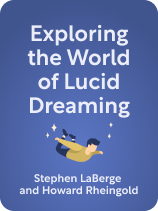

This article is an excerpt from the Shortform book guide to "Exploring the World of Lucid Dreaming" by Stephen LaBerge and Howard Rheingold. Shortform has the world's best summaries and analyses of books you should be reading.
Like this article? Sign up for a free trial here.
Want to know how to improve your problem-solving skills? How can lucid dreaming produce creative breakthroughs?
In the book Exploring the World of Lucid Dreaming, the authors explain how you can work through your problems while you sleep. This is partially because you have greater access to your subconscious mind.
Keep reading to learn how to solve problems and make decisions while dreaming.
Solve Problems and Make Decisions in Your Sleep
In lucid dreams, you can work through problems by experimenting without limitations, which can help you improve your problem-solving skills and make better decisions. Even non-lucid dreams are powerful problem-solving playgrounds for our minds: Throughout history, engineers, physicists, mathematicians, writers, and artists of all varieties have been making important creative and intellectual breakthroughs in their dreams. Lucid dreams tap into the problem-solving potential of dreams and amplify this potential by giving you the agency to decide what to focus on.
(Shortform note: Many self-help and business experts disagree with the authors that environments of limitless possibility and choice (like lucid dreams) are good for creative thinking and problem-solving. They argue that embracing constraints is the key to creative thinking and problem-solving. When you impose boundaries, whether they’re physical, conceptual, or resource-related, it forces you to think outside the box and find innovative solutions within these constraints. For example, giving yourself a deadline or writing a story with a specific word count can challenge and enhance your creative thinking.)
Another reason lucid dreaming can produce breakthrough creative solutions is because you have greater access to your subconscious mind while you dream, which, the authors explain, stores a lot more information and wisdom than we realize. Lucid dreams provide greater access to that information and wisdom because the conscious mind is less active during sleep.
(Shortform note: Though the authors claim your conscious mind is less active while you sleep, recent neuroscience studies show this isn’t always true. While you’re lucid dreaming, your brain shows similar activity to waking states, with increased activity in regions associated with focused attention, working memory, planning, and self-awareness. This suggests that, rather than giving us more access to our unconscious minds, lucid dreams emerge from our conscious minds.)
You can make more informed decisions in lucid dreams by acting out the different paths or scenarios that you’re faced with in waking life. By experiencing the consequences of each decision as they could happen in waking life, you’ll be more prepared to choose what is best for you and those around you.
(Shortform note: When you act out different scenarios in a lucid dream, you’re experimenting with possibilities to make better decisions. In The Innovator’s DNA, Jeff Dyer, Hal Gregersen, and Clayton M. Christensen argue that experimenting is key to creative problem-solving and innovation. They argue that when you actively seek out new experiences, test new ideas, and take risks, you can challenge assumptions, learn from your failures, and uncover unexpected insights that can lead you to innovative insights that help you make good decisions.)

———End of Preview———
Like what you just read? Read the rest of the world's best book summary and analysis of Stephen LaBerge and Howard Rheingold's "Exploring the World of Lucid Dreaming" at Shortform.
Here's what you'll find in our full Exploring the World of Lucid Dreaming summary:
- Ways to prepare for lucid dreaming
- How to purposefully “wake up” in your dreams
- The many ways lucid dreaming can improve your waking life






